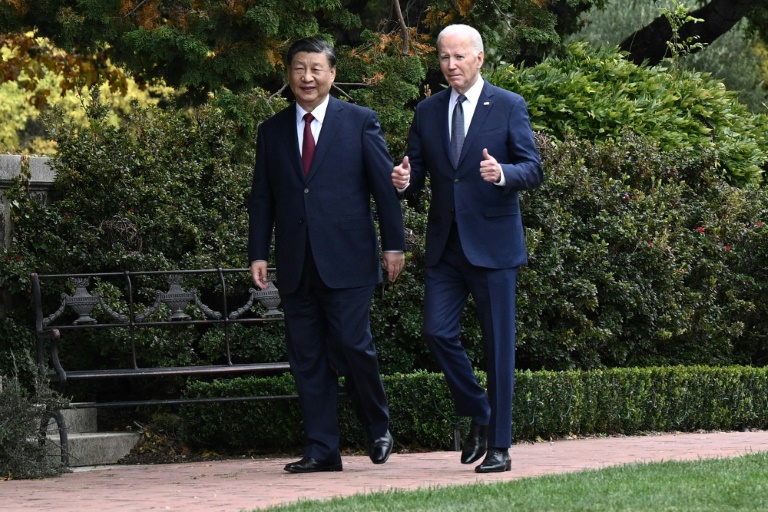Biden, Xi leaders speak to manage tension, with top US officials to visit China

US President Joe Biden and Chinese President Xi Jinping walk together after a meeting in Woodside, California on November 15, 2023
Washington – President Joe Biden and Xi Jinping spoke Tuesday in a new bid to manage tensions between the United States and China, with top US officials to head shortly to Beijing, officials said.
The telephone conversation was the two leaders’ first direct interaction since a summit in November in California that saw a marked thaw in tone if not the long-term rivalry between the world’s two largest economies.
Secretary of State Antony Blinken and Treasury Secretary Janet Yellen — who have both voiced a willingness to find areas to work with China even while maintaining pressure — will soon visit China.
Yellen will leave in the coming days, while Blinken will travel in the coming weeks, a senior US official said.
“Intense competition requires intense diplomacy to manage tensions, address misperceptions and prevent unintended conflict. And this call is one way to do that,” the official said on condition of anonymity.
Chinese state broadcaster CCTV said that the two leaders had a “candid and in-depth exchange” on issues of common concern.
Xi, China’s most powerful leader in decades, has solidified power at home and taken a tough approach in Asia, with a crackdown on freedoms in Hong Kong and assertive confrontations in recent weeks with the Philippines on the South China Sea.
But US observers see Xi as eager to notch down friction with the United States as China weathers rough economic headwinds.
At the California summit, he agreed to two key asks by the United States — curbs on precursor chemicals to fentanyl, the synthetic painkiller behind a US overdose epidemic, and restoring dialogue between the two militaries to manage crises.
Xi may also see more opportunity for cooperation with Biden, who faces a rematch in November elections against Donald Trump, who has cast China as an arch-enemy.
Biden has preserved or even accelerated some of Trump’s tough measures, with China infuriated by Biden’s sweeping ban on exports of high-end semiconductors.
But the current administration has also identified areas of common interest, such as fighting climate change.
– Raising alarm on Taiwan –
The US official said that the call was more of a “checking in” than a forum for new policy outcomes.
The official said that Biden had planned to repeat familiar concerns on the call, including over China’s trade practices and over regional tensions.
Biden also planned to “reiterate the importance of peace and stability across the Taiwan Strait” ahead of the inauguration on May 20 of President-elect Lai Ching-te.
China has denounced Lai, a longtime supporter of a separate identity for the self-ruling democracy claimed by Beijing, but US officials have been cautiously optimistic that China’s military moves ahead of the inauguration will not go beyond past practice.
Biden, the official said, was also to raise “destabilizing” actions in the South China Sea including “dangerous recent action” by the Chinese forces against the Philippines.
The Biden administration, while maintaining dialogue with China, has put a strong focus on supporting allies.
In the midst of the China diplomacy, Japanese Prime Minister Fumio Kishida will pay a state visit next week, with Philippine President Ferdinand Marcos joining for three-way talks in Washington.
Blinken also visited the Philippines last month where he reaffirmed US commitments to defend the ally.
Blinken and Yellen will both be paying their second visit to China in less than a year, marking a return to more routine interactions between the powers.
Blinken’s trip last year was the highest-ranking by an American in five years, following the Covid pandemic and soaring tensions under Trump.
The extensive diplomacy stands in contrast with Biden’s approach to Russian President Vladimir Putin, whom he has shunned since the invasion of Ukraine.
The US official said the United States was concerned by growing Chinese efforts to help Russia rebuild its military-industrial base, calling it a risk for European security.
